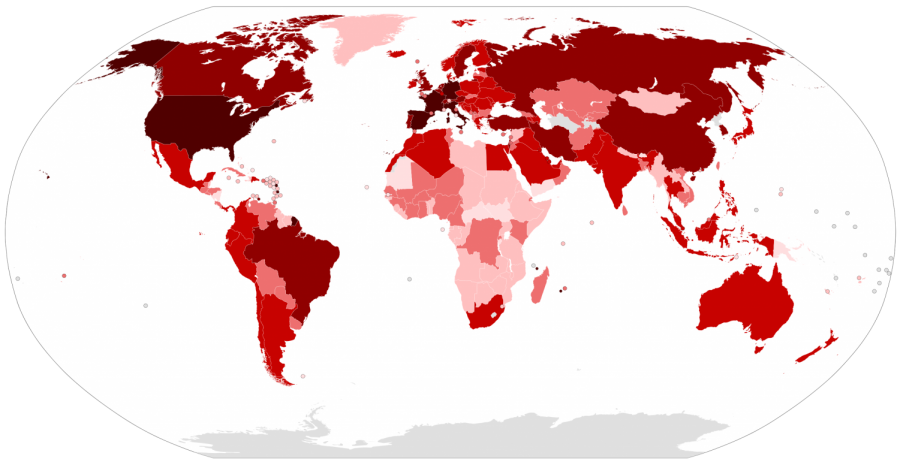So far, 2020 has seen a conflict between Iran and the United States, the Australian wildfires, the death of Kobe Bryant, and now COVID-19. Unlike other conflicts, this pandemic has majorly affected all countries, from school and business closures to medical supply shortages to low-wage workers worrying about how they make ends meet. Regardless of universal concerns, each region of the globe appears to be handling the crisis differently.
Far East :
Everything started in Wuhan City, China, where the virus was recognized but not initially reported. China went into severe lockdown to face the virus, but many regions around or in contact with the country were still infected in the process. Though they overcame the first wave, they are in fear of a second wave; not through the means of their people, but by the means of trade. This lockdown does not even allow international flights. Many Asian residents stuck abroad are concerned about when they will be able to go back home, many of them being college students unable to find a place to settle.
The country was previously accused of hiding their numbers at the beginning of the crisis, although this was never confirmed.
Though a lot of the Far East is still struggling, South Korea has taken a different, yet effective, course of action. South Korea began by controlling the face mask shortage after pharmacies faced multiple difficulties in selling and properly distributing the masks without facing abusive behavior or panic in the store. The president, Moon Jae-in, was contacted by many leaders for the details of the action he took that helped South Korea flatten the curve.
Italy:
After 152 cases and three deaths, Italy declared a shutdown on schools; however, it left restaurants and cafes open until 6 p.m. The New York Times argued that this shutdown took place later than necessary and was not handled properly. This has been speculated to be the reason why Italy surged multiple times until the country was finally placed on lockdown. Compared to other countries, Italy took a lighter approach to restrictions and faced many deaths.
America:
America’s situation is currently very complicated and severe according to many released reports. Dr. Anthony Fauci, director of the National Institute of Allergy and Infectious Diseases, warned that as many as 200,000 citizens could die. Washington state was once reported as the center of the outbreak in the United States; however, it has been able to flatten the curve, as it was recently reported the state had 9,608 known cases on Sunday with 446 deaths. Not only has Washington acted quickly to improve its numbers, it has paid the supplies forwards and decided to return more than 400 ventilators as the state faces better conditions and more recoveries.
New York has now become the epicenter and is the hardest-hit state in the country by the coronavirus, as it faces an overwhelming number of calls on their 911 systems and the cases increase.
President Trump says he expects new infections to peak in the coming weeks, even as he extends social distancing guidelines. Recently Trump signed an $8.3 billion emergency coronavirus aid package, which shows the urgency of the administration to repair the economy. Though efforts by the government can be seen, it seems that the world is struggling to count and report numbers properly, as US experts said on April 5 that the U.S. is undercounting the number of people who have died in the pandemic.
Bill Gates has announced that the Bill & Melinda Gates Foundation, Wellcome, and Mastercard have released a Therapeutics Accelerator. He also shared his views on how the situation will look in the coming days. Not only is he acting currently, but he also has stated in many of his previous speeches how there will be a new virus, a warning he sent for the COVID-19, that many scientists and health specialists along with him warned us about.
England:
On March 24, Boris Johnson issued a stay-at-home order. This order was put in place due to the significant increase in COVID-19 patients. Not only was the general population infected, but also many of England’s leaders received positive results for the virus.
On March 27, Prince Charles went into isolation after receiving a positive test result, while a top adviser to Prime Minister Boris Johnson went into quarantine. Johnson was admitted to the hospital for tests on April 5. He is taking this step as a precautionary matter, as he is still dealing with symptoms of coronavirus after testing positive for the virus. He has since been released from the ICU. Also on April 5, Queen Elizebeth the II gave a speech in which she thanked all the health workers, people who are staying at home, businesses helping with resources, and others. She also reminded England that they have been through similar times before and have gotten through it and they can get through it now, as well.
Pakistan:
Pakistan is one of the many third-world countries dealing with the virus. Many third-world countries are trying to manage the virus as properly and quickly as possible. Though first-world countries like the U.S. and England are at risk in their economy and population, third-world countries are more likely to suffer more during a pandemic. Therefore, they have to watch out for the easy plummet of their economy. Recently, Imran Khan, Prime Minister of Pakistan, announced that though all public gathering areas are closed, he is keeping construction open in order to keep the country running, as he is concerned about the issues Pakistan will have to face. When the virus’s arrival was recognized in Pakistan, Prime Minister Khan was hesitant in placing a lockdown in the country due to the effect it could have, especially on minimum wage workers and the economy. However, he followed through and began the lockdown, which includes fines and punishments for those who do not follow the lockdowns rules and regulations.
Germany:
Germany, similar to South Korea, is not receiving as much damage as other countries. Germany has had 100,000 plus cases but faces a lower death rate. They have “Corona taxis,” people who check on the patients who are diagnosed to report their situation. They also take blood tests to recognize if their state is going to face a decline, and therefore, handle the situation before it gets worse, and recognize the patients’ health appropriately. Germany and South Korea, at the moment, stand as role models during this pandemic as they find their way to flatten the curve that other countries seem to be struggling with.
Globally:
Every region has its own way of handling the pandemic, and only time will tell which efforts are truly the most effective. One tactic that is known and used universally, even by Kinnelon, is to stay at home. During this time, trusting health officials and listening to government mandates is all an individual can do. In New York and New Jersey, “stay at home” orders are proven to currently be helping flatten the curve.









